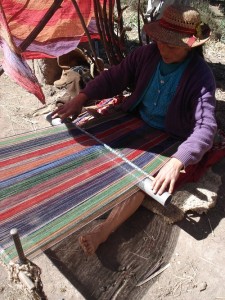The People of Totora
July 28, 2010
Vilma and another women named Sabina lead the way up another dirt road next to the river until we arrived to a shaky bridge that lead through a yard with some piglets and two goats. On the ground sat a man who was shaving the fur of a dried out goat skin. He had few teeth and even those were in bad condition. Chewing on coca leaves to relief the pain he explained to the women that he has not been able to walk anymore. He pulled up his trouser leg and showed us what truly did not look like a knee. Thin to the bone, his knee had been inflated with liquid and not in the spot it should be in. He carries himself on his knuckles or occasionally if the strength allows he manages to walk with a cane. His leg is useless and slows his life down, slows his income down. His hands were strong and showed years of work and even in his bad health conditions this old man still managed to laugh. The next person we visited was an old lady trekking up the mountain in front of me while I was out of breath following her. No more teeth than the previous man, she showed us her hand made scarf with details that must have taken ages. We sat in between two mud houses to escape the afternoon heat. The women held their conversations, laughing away and occasionally steering back to health issues. She was fine, still holding strong and feeding some herbs to her guinea pigs. Lastly we went and saw a couple who sat on the ground, a large tarp provided them with shade and the cats, dogs, hens and pigs were circling around them. Both of the people were weaving skilled and detailed carpets on an innovative weaving frame. They told me that they spend two weeks, ten hours a day to complete one which they then sell for only 100 soles (about $ 35). With their eyes focused on the colorful pattern and their hands moving fast, they said that they are in need of a market where they can sell their goods for a better price, a fair price. To conclude an eventful day with some valuable lessons the bottom line is that these people are living parallel to the land, to the seasons and simple. They have little and they do not ask for much. They deserve basic human rights in order to feed their families, seek health care, and have an education. It all seems to be common sense but apparently common sense is not so common at all. I was thinking, after visiting and spending some time with the people, in the school, and hiking around this breathtaking area how admirable these people are. To give their time to teach children although not being paid much, to continue to work hard even though a disability is making even the smallest movement strenuous, to hike as though years have never passed, to weave with perfection for a bit of an income… These people are heroic. Every house I visited, the people ran to grab a log, removed the cloth from their back to provide a cushion and asked me to sit, offering me fresh boiled potatoes and laughing out loud. The sense of community in Totora was in inspiring and the humble hearts along this day remind me how little help can go such a long way. Sandra’s health workers attending to the people, giving them someone who cares, even if it is just to visit and hold a conversation provides the community with hope. ~marina
Entry Filed under: Community Health Team. Posted in Community Health Team .



Trackback this post | Subscribe to the comments via RSS Feed